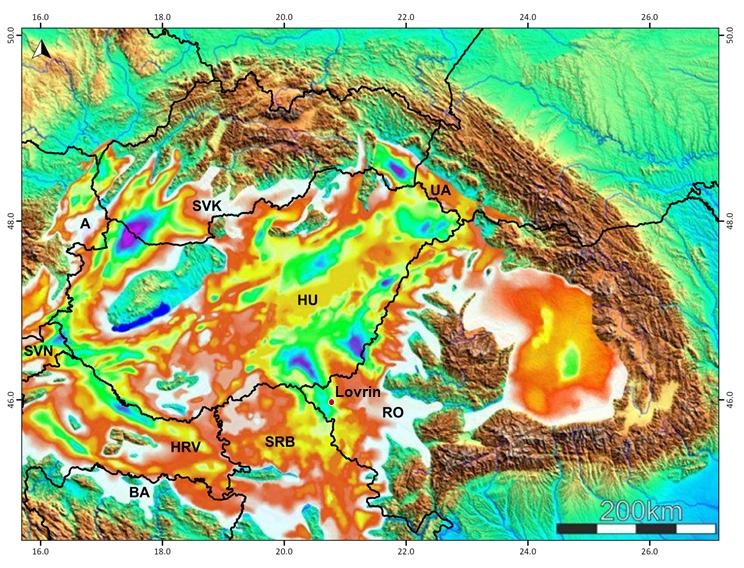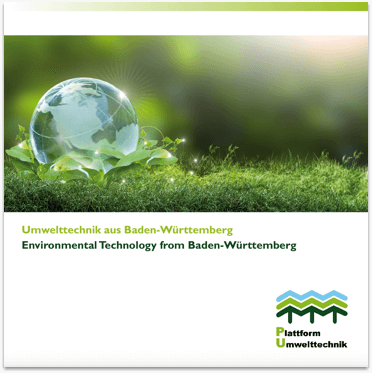Projects
Baden-Württemberg/Hungary: Communicative, organisational, technical and economic solutions for the recycling of biological waste
The Hungarian Waste Management Act of 2012 defines the waste management objectives and general principles aimed at the careful management and sustainable use of natural resources.
A large proportion (about 30%) of the approximately 3 million tons of municipal solid waste produced in Hungary each year consists of biodegradable organic material, which can be composted and returned to nature through recycling.
The participants in the Hungarian waste management sector are endeavouring to use modern infrastructure to encourage the population to collect green waste separately.
Although the green waste is collected separately, it contains foreign matter that prevents it from being recycled without restriction. These impurities do not degrade in the composting process. The various packaging materials (e.g. glass, plastic and metal) are the most common in the green waste from the public collection.
The population often provides the green waste in plastic bags that are difficult to degrade, instead of using the green waste bags offered specifically for this purpose.
Green waste in Hungary is composted according to the state of the art. However, the elimination of foreign matter in green waste and thus in compost is a major problem. The problem cannot be solved satisfactorily with the machines and methods used.
The operation of the whole system is associated with high costs. The quality of the compost is low due to the large amount of foreign matter. The compost contaminated with foreign matter cannot be recycled and ends up in landfills as covering material. In this way, the recycling of organic waste cannot contribute to the reduction of waste disposal costs and environmental protection.
From an environmental point of view, it is necessary to return organic waste to the natural cycle. The state of Baden-Württemberg and Hungary would like to solve this problem jointly through their cooperation.
The aim of the cooperation was to find a practicable solution to the difficulties described with regard to the separation and removal of foreign matter from the compost.
In the technical dialogue between the representatives from Baden-Württemberg and Hungary – above all the Miskolc region – it was discussed how the compost could be of better quality in the future and how larger quantities could be used for horticultural or agricultural purposes.
In February 2019, network partners of the PU undertook a study trip to Hungary and visited relevant composting plants, where they were able to gain an impression of the differentiated local conditions.
In return, the Hungarian partners from Miskolc visited selected composting and waste treatment plants in the Stuttgart area in June 2019 in order to obtain valuable information about these businesses in Baden-Württemberg.
On 17 September 2019, representatives of the 21 waste regions from Hungary were invited to participate actively in the final information event on our project at the Hungarian Ministry of Innovation and Technology (Budapest). A large part of them followed this invitation to Budapest to get informed and to discuss the topic with us.
Baden-Württemberg was represented by:
- Martin Kneisel (Ministry of the Environment, Climate and Energy)
- Ingrid Müller (Platform Environmental Technology)
- Ulrich Hommel (AwiPlan-PPD GmbH)
- Prof. Dr. Carla Cimatoribus (University of Esslingen)
- Dirk Kurzschenkel (Waste Management Company Göppingen)
- Ralf Müller (Biodegma GmbH)
For the Hungarian side was presented:
- Tibor Nemcsek (Managing Director of NHSZ Abfallwirtschaft GmbH, Budapest) – brief outline of the history and current state of composting and green waste collection in Hungary.
- László Aleksza (General Director of Profikomp Környezettechnika Zrt., Gödöllő) – Presentation on the challenges in Hungarian composting (saving of artificial fertilizers, promotion of economic efficiency as the most important factor of the recycling economy, etc.)
- Tibor Toth (team leader of ZV Zöld Völgy Nonprofit Kft., Sajókaza) – Presentation of the composting plant in the Sajókaza Waste Management Center
Finally, Ms. Prof. Dr. Carla Cimatoribus animated the auditorium for discussion, which was also gladly used by some participants.
In order to give this project a supra-regional character, the results are available for download in German, Hungarian and English. In addition, the results will be made available electronically to all participating institutions and companies on both the Hungarian and Baden-Württemberg sides.
This project was authoritatively supported financially by the Ministry of State ![]() and the Ministry of Environment, Climate and Energy of the State of Baden-Württemberg
and the Ministry of Environment, Climate and Energy of the State of Baden-Württemberg ![]() .
.
Presentations for download:
- Tibor Nemcsek (EN)
- László Aleksza (EN)
- Tibor Toth (EN)
- Martin Kneisel (EN)
- Ingrid Müller (EN)
- Dirk Kurzschenkel (EN)
- Ralf Müller (EN)
- Dr. Carla Cimatoribus (EN)
Results for download:
Geothermal district heating in Romania - Utilisation potential and optimisation strategies for the municipalities of Lovrin

The municipalities of Lovrin, Gottlob (both Timis County), as well as the municipality of Pecica (Arad County) have expressed the political wish to use the given possibilities of geothermal energy in this region and to develop a concept for an environmentally friendly and sustainable operation of a district heating network from geothermal resources for the municipalities (feasibility study).
The Platform Environmental Technology e.V. (PU) agreed to support the municipalities in preparing a feasibility study on the utilisation potential and optimisation strategies for geothermal district heating.
In doing so, PU worked together with the following members and partners:
- Weber-Ingenieure GmbH (Pforzheim)
- GeoThermal Engineering GmbH (Karlsruhe)
- Weber Romania SRL (Timisoara/RO)
- Ministry of Environment, Climate and Energy, Department 14 Europe, International Cooperation, Ms Carmen Hawkins
In addition to the technical and financial contribution from Baden-Württemberg, the project has contributed to capacity building through the transfer of knowledge and skills in the political sector, in administration and management, to the improvement of personnel and institutional capacities and to the participation of citizens.
This project was authoritatively supported financially by the Ministry of State ![]() and the Ministry of Environment, Climate and Energy of the State of Baden-Württemberg
and the Ministry of Environment, Climate and Energy of the State of Baden-Württemberg ![]() .
.
Results for download (DE):
Sustainable internationalisation strategy of the PU
The PU supports its members in bringing Baden-Württemberg’s environmental technology to international markets.
Developments such as climate change, digitalisation or demographic change have been continuously changing international markets for decades. These trends, but also Baden-Württemberg’s strength in the environmental technology and energy sector, led to the founding of PU in 1996. Since then, PU has been dedicated to the internationalisation of environmental technology in Baden-Württemberg and supports small and micro enterprises in particular.
In order to take account of developments on the world markets and to keep PU’s offers for its members up-to-date and practice-oriented, a new internationalisation strategy was developed together with its members and with the support of the ClusterAgentur Baden-Württemberg (CABW) and Baden-Württemberg International (bw-i). This made it possible to adapt a new strategy to the needs of the members, so that it is also supported by them.
Based on criteria defined at the beginning, an evaluation matrix was created with the help of bw-i.
This showed that the countries Hungary and Romania could be finally defined as target countries.
For further information please contact the network management.
Sludge incineration plant in Eger, Hungary, within the scope of the EU-Danube rum strategy of the country Baden-Wurttemberg
The project „municipal sludge disposal project EGER, Hungary“ originated from a cooperation of the Platform Environmental Technology with the Hungarian enterpriser, Mr. Morvai. Besides, it is about a sludge incineration plant by which directly in sewage plants wet sludge can be burnt and with it stream and warmth be generated. The arrangement works currently in vote with the Hungarian authorities in the enlarged test company for the optimization. Now the plausibility of the investment technology should occur through the university of Stuttgart.
The PU means were granted for the financing by exhaust gas measurements by the University of Stuttgart, Institute of Settlement Hydraulic Engineering, Water Goodness and Waste Industry, in cooperation with the University of Budapest. By the implementation of the exhaust gas measurements should be helped to the project to the marketability, while the observance are confirmed by EU norms.
The special lastingness of the project arises from:
- Short routes of transport to the regional utilization place, thereby lower CO2 load
- Rejected heat use for the energy-efficient full drying poor in issue of the sludge
- Use of thermal energy for different processes (inside and externally)
- Delivery of CO2 more neutrally thermal and electric energy with substitution of fossil primary energy sources
- By the thermal utilization no investment is necessary with the sewage work operators for measures of hygiene.
Contact:
Michael Auer
Chairman of the Platform Environmental Technology
Gerhard-Koch-Str. 2-4
73760 Ostfildern, GERMANY
Tel.: +49 711 327325-33, Fax: +49 711 327325-69
mailto:pu@lvi.de, https://www.pu-bw.de




